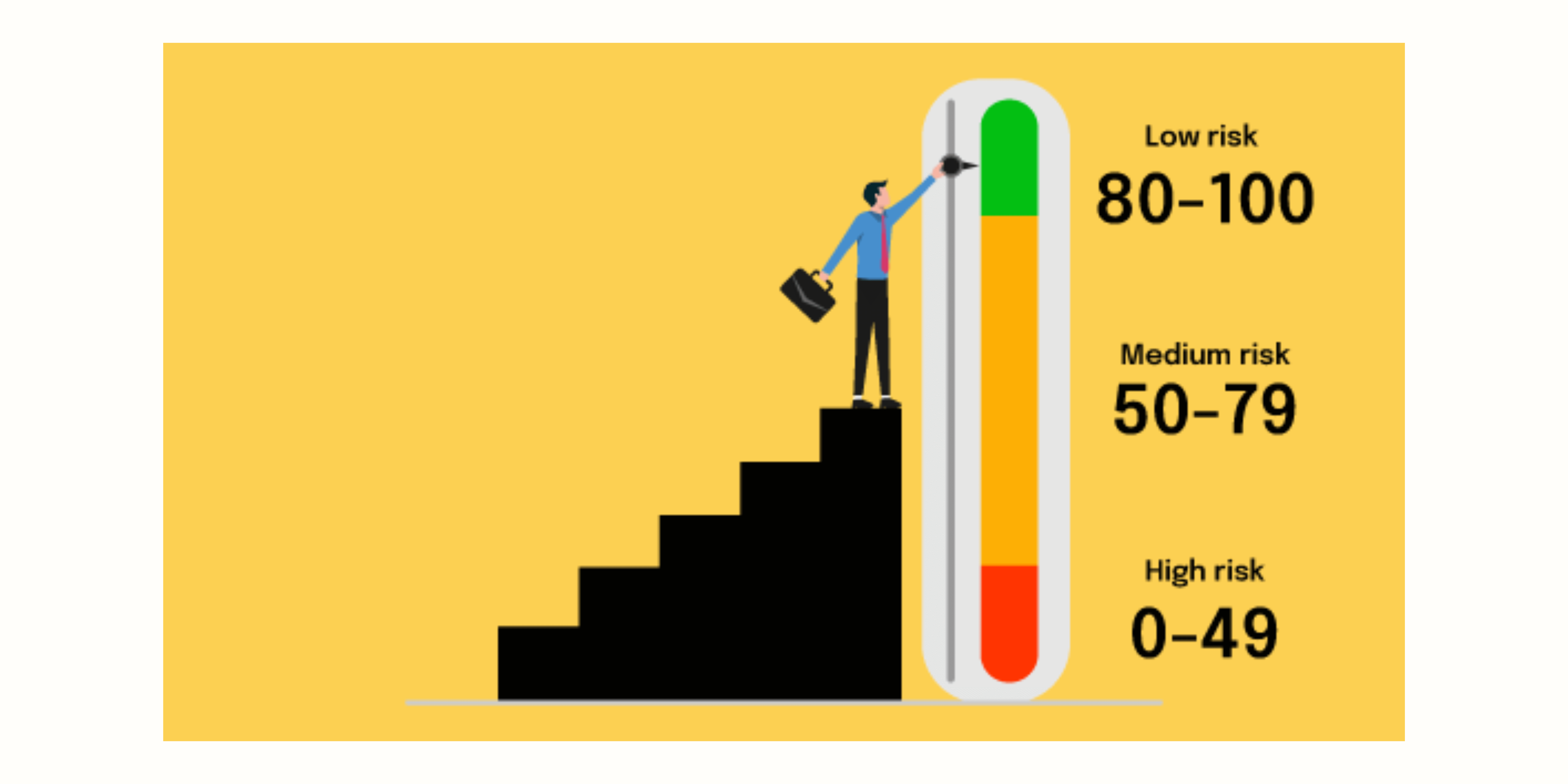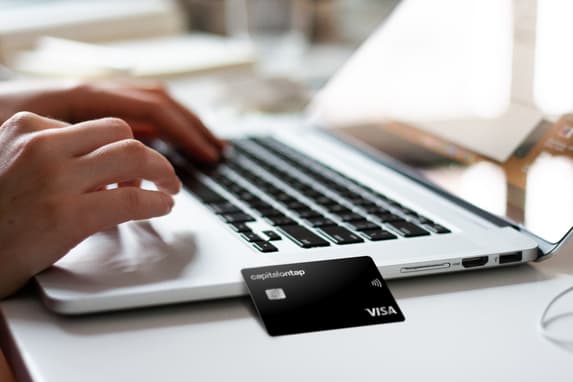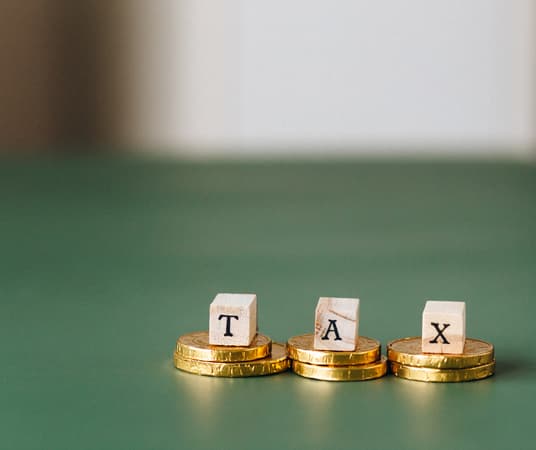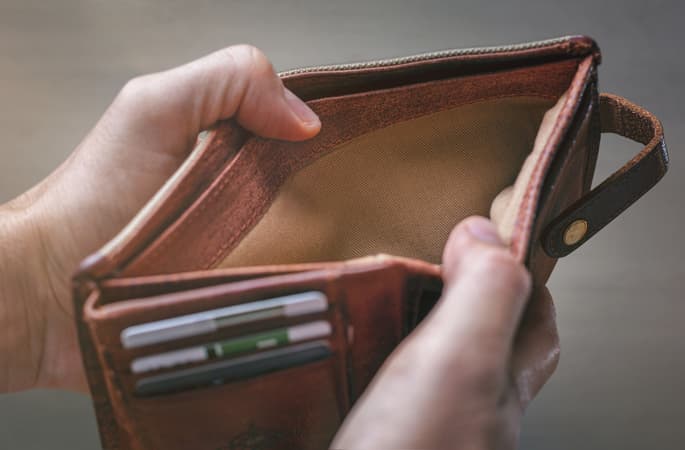Jump to a section
You know you have a personal credit score, but did you know you have a business credit score too? According to Experian, almost 66% of business owners have never reviewed their credit score, and almost 9 in 10 are unaware of the factors that determine their score.
A business credit score is not just a number; it's a critical indicator of your financial stability and trustworthiness to pay back money. A healthy score can make all the difference when it comes to securing financing and getting favourable terms from lenders.
That's why taking the time to understand your credit score and monitoring it regularly would be a wise move for any small business owner. By staying on top of your credit score, you can unlock opportunities and position your business for long-term success.
What's a business credit score?
Your business credit score is the number that represents how lending institutions view your creditworthiness and illustrates the likelihood of obtaining funding for your business. The higher your score, the higher the chance you’ll repay your debt so lenders are likely to give your business a higher credit limit.
Your business credit score works similarly to your personal credit score.
Personal credit scores range from a low of 0 to a high of 999. A personal credit score above 721 is considered average to low risk.
A business credit score ranges from 0 to 100. Most business lenders require a score at or above 75.
Why is my credit score important?
According to statistics from the UK government, 88.3% of startups survive their first year, but only 39.6% of new businesses make it beyond five years, often due to limited finance options. A business credit score plays a significant role in a company's ability to access financing, and having a strong credit history is crucial for long-term success.
Failing to establish a good credit score could limit your business' access to credit, resulting in higher interest rates and collateral requirements. Moreover, business partners may view a low credit score as a sign of risk, which could negatively impact your potential partnership opportunities. As a result, you should invest time and effort into building a strong credit history to increase their chances of success.
How is a business credit score calculated?
Your credit score is calculated by credit reporting agencies (CRAs). In the UK, the 3 main CRAs are Equifax, TransUnion, and Experian.
CRAs look at multiple aspects of your financial history to calculate your business credit score, taking into account information such as:
- Your bill repayment history if your business has borrowed before - if you have defaulted on payments this will detract from your credit score
- Whether you’ve exceeded an overdraft limit - if you have, this is likely to detract from your score
- How long your business has been running - the longer your business has been running, the better the impact on your score
- Your industry - businesses in historically riskier industries including bars, restaurants, and retail are likely to have lower credit scores
- The size of your business - this is measured by CRAs either in annual revenue, owned assets, shareholders’ equity, or market capitalisation
- Your personal credit score - if you have responsibly managed your own credit, this will positively affect your business’ credit score
- The number of times you’ve applied for credit in the past, and whether you were accepted or rejected
- Any trade credit - any missed or late repayments will hamper your credit rating
- Any outstanding debts you may have such as loans and credit cards - this is not necessarily a bad thing for your score. If you’re using the credit responsibly and paying it back on time, it proves to lenders that you’re not a risky applicant so will likely help your score.
- Assets - if your business owns any assets, such as property or land, this will impact your business score
- Any outstanding CCJs (County Court Judgements) against your business
Each CRA uses this information in a slightly different way, so your score may be slightly different at each CRA.
In the UK there are 3 main CRAs:
TransUnion: TransUnion, previously CallCredit, offers free credit reports, scores, and monitoring to both individuals and businesses. They use advanced analytics to help businesses manage credit risk and make informed decisions about their customers and suppliers.
Experian: Experian is a global information services company that provides credit reports, credit scores, risk reports, and credit monitoring to businesses and consumers.
Equifax: Equifax is a global data, analytics, and technology company that provides credit reports, credit scores, and credit monitoring to businesses and consumers. They offer a range of services to help businesses manage credit risk, prevent fraud, and make informed decisions.
Business credit score ranges
In the UK, business credit score ranges vary slightly between CRAs but in general credit score fall within the following ranges:
Low risk: 80-100
Medium risk: 50-79
High risk: 0-49

How to check my business credit score?
You can check and monitor your business credit score by obtaining a report from a CRA or credit monitoring agency.
Once you fill out the information requested, they will generate a report which includes your business credit score. You will receive this report via email, post, or in an online account.
CreditSafe
Creditsafe is a credit reference agency that offers businesses access to credit reports, credit scores, and other financial data. Their services help businesses manage credit risk and make informed decisions about their customers and partners.
Creditsafe offers free credit reports to registered directors of businesses.
Credit Passport
Credit Passport’s platform allows businesses to check their credit scores and for free, as well as obtain insights into factors that affect their creditworthiness.
In addition to their free offering, Credit Passport provides a subscription-based service that offers tools to help businesses improve their credit scores. They also offer a range of financial planning and management services, such as cash flow forecasting and scenario planning.
Equifax
Equifax offers a range of reports and insights into a business’ financial health.
Equifax allows company secretaries, limited company directors, business owners, and partners to request their business credit report by contacting their team.
Experian
Experian's My Business Profile subscription is designed for small businesses seeking to manage their credit scores in real-time by providing in-depth reports on the factors impacting their credit score and alerts about any changes to your score.
To register for this service, you must be a registered director or owner of the business, and you can opt for their free three-month trial.
How can I get free business credit scores?
You can get a free business credit score from many CRAs, but some may require payment for report breakdowns or monitoring credit scores over time.
CreditSafe and CreditPassport both provide businesses with a free credit score report.
Frequently asked questions
Small business owners’ frequently asked questions about business credit scores:
Is a business credit score different from a personal credit score?
Yes, a business credit score is different from a personal credit score.
A personal credit score is based on an individual's credit history and is used to evaluate their creditworthiness for personal loans, credit cards, and other personal financial products.
A business credit score is based on a company's credit history and is used to evaluate its creditworthiness for business loans, credit cards, and other business financial products.
Does a business have a credit score?
Yes, a business has a credit score.
Just like individuals, businesses have credit histories that are used to calculate credit scores. Credit scores for businesses are calculated based on factors such as payment history, credit utilisation, length of credit history, and public records.
What is a good business credit score?
A good business credit score can vary depending on the credit reference agency and the industry, but generally, a score of 80 or above is considered good and indicates that the business is a low credit risk.
How to check my business credit score for free?
You can check your business credit score for free using credit monitoring platforms, but some may require payment for report breakdowns or monitoring credit scores over time.
CreditSafe and CreditPassport both provide businesses with a free credit score report.
Will a business loan or credit card affect my personal credit score?
Whether a business loan or credit card will affect your personal credit score depends on the type of financing and the lender's reporting practices.
If you apply for a business loan or credit card using your personal credit history and are personally liable for the debt, then the loan or credit card will likely appear on your personal credit report and impact your personal credit score.
On the other hand, if the financing is solely in the name of your business and you are not personally liable for the debt, then it may not appear on your personal credit report or affect your personal credit score.
It's important to review the terms and conditions of any financing agreement carefully and speak with the lender to understand how the loan or credit card will be reported to credit bureaus. Additionally, making timely payments on any loans or credit cards can help improve both your business and personal credit scores over time.
What is a good credit score for a small business?
There is no one-size-fits-all answer to what is a good credit score for a small business, as credit score ranges can vary depending on the credit reference agency and the industry. However, in general, a good credit score for a small business is a score of 80 or above.
Does a limited company have a credit score?
Yes, a limited company (Ltd) has a credit score. A limited company is a legal entity that is separate from its owners, and as such, it can establish its own credit history and credit score.
The credit score for a limited company is based on the company's payment history, credit utilisation, length of credit history, and other factors.











